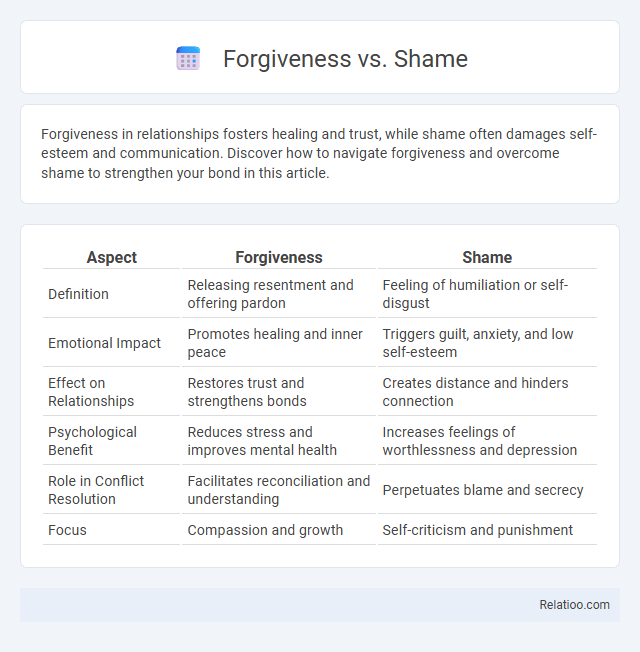Forgiveness in relationships fosters healing and trust, while shame often damages self-esteem and communication. Discover how to navigate forgiveness and overcome shame to strengthen your bond in this article.
Table of Comparison
| Aspect | Forgiveness | Shame |
|---|---|---|
| Definition | Releasing resentment and offering pardon | Feeling of humiliation or self-disgust |
| Emotional Impact | Promotes healing and inner peace | Triggers guilt, anxiety, and low self-esteem |
| Effect on Relationships | Restores trust and strengthens bonds | Creates distance and hinders connection |
| Psychological Benefit | Reduces stress and improves mental health | Increases feelings of worthlessness and depression |
| Role in Conflict Resolution | Facilitates reconciliation and understanding | Perpetuates blame and secrecy |
| Focus | Compassion and growth | Self-criticism and punishment |
Understanding Forgiveness and Shame
Understanding forgiveness involves recognizing it as a conscious decision to release resentment and let go of negative emotions, which fosters emotional healing and personal growth. Shame operates as a powerful, often debilitating emotion tied to feelings of unworthiness and self-judgment, frequently impeding forgiveness and increasing anxiety levels. Your ability to differentiate between self-forgiveness and shame is crucial for reducing anxiety and promoting mental well-being.
The Psychological Roots of Shame
The psychological roots of shame are deeply embedded in early childhood experiences where unmet emotional needs and critical caregiving create a persistent sense of inadequacy. Shame triggers a fear of rejection and social disconnection, contrasting with forgiveness, which fosters emotional healing and resilience by promoting self-compassion. Anxiety often emerges as a byproduct of unaddressed shame, amplifying feelings of vulnerability and perpetuating a cycle of negative self-beliefs.
How Forgiveness Transforms Emotional Pain
Forgiveness transforms emotional pain by releasing the burden of resentment and enabling psychological healing, which contrasts sharply with the corrosive effects of shame and anxiety that intensify emotional distress. Neuroimaging studies reveal that acts of forgiveness activate brain regions associated with empathy and positive affect, reducing stress hormones linked to anxiety disorders. Embracing forgiveness fosters resilience, promotes emotional regulation, and supports mental health recovery, breaking the cycle of shame-induced self-criticism and anxiety-driven fear responses.
Shame’s Impact on Mental Health
Shame significantly contributes to mental health disorders such as depression, anxiety, and low self-esteem by fostering negative self-perceptions and emotional distress. Unlike forgiveness, which promotes emotional healing and resilience, shame perpetuates feelings of worthlessness and social isolation, exacerbating psychological vulnerabilities. Addressing shame through therapeutic interventions can reduce its harmful impact, improving overall mental well-being and preventing long-term emotional damage.
The Role of Forgiveness in Healing
Forgiveness plays a crucial role in healing by releasing the burden of shame and reducing anxiety linked to past experiences. When You choose forgiveness, it allows emotional wounds to mend, fostering inner peace and resilience. This process helps break the cycle of negative emotions and promotes psychological well-being.
Social and Cultural Views on Forgiveness and Shame
Social and cultural views on forgiveness often emphasize its role in restoring relationships and promoting community harmony, while shame is frequently perceived as a tool for social control that enforces conformity and moral behavior. In many cultures, forgiveness is considered a strength that fosters resilience, whereas shame can lead to social exclusion and internalized anxiety. Your understanding of these dynamics can influence how you navigate interpersonal conflicts and emotional healing within your cultural context.
Strategies to Move from Shame to Forgiveness
Shifting from shame to forgiveness involves recognizing and challenging the negative self-beliefs that fuel shame while cultivating self-compassion. You can practice mindfulness to observe feelings without judgment and reframe mistakes as opportunities for growth rather than personal failings. Engaging in therapy or support groups enhances emotional resilience and provides tools to replace shame with self-forgiveness and acceptance.
The Benefits of Letting Go of Shame
Letting go of shame can profoundly improve your emotional well-being by freeing you from self-judgment and fostering self-compassion. Forgiveness plays a crucial role in this process, allowing healing to replace feelings of unworthiness and reducing anxiety linked to past mistakes. Embracing forgiveness over shame cultivates resilience, enhances mental health, and promotes healthier relationships.
Common Misconceptions About Forgiveness
Forgiveness is often misunderstood as condoning harmful behavior or forgetting the offense, but it primarily involves releasing resentment to promote emotional healing. Many mistakenly believe forgiveness requires immediate reconciliation or that it erases the impact of shame and anxiety, while it actually serves as a personal process to reduce psychological distress. Understanding forgiveness as a self-healing tool rather than a moral obligation helps alleviate anxiety and mitigates the debilitating effects of shame.
Cultivating a Forgiving Mindset
Cultivating a forgiving mindset transforms emotional pain by replacing shame and anxiety with compassion and understanding, promoting mental resilience and emotional healing. Neuroscientific studies show that practicing forgiveness reduces activity in the amygdala, the brain's center for fear and stress, thereby lowering anxiety levels. Integrating mindfulness techniques and self-compassion exercises fosters a healthier psychological framework, enabling individuals to overcome negative self-judgments tied to shame.

Infographic: Forgiveness vs Shame
 relatioo.com
relatioo.com